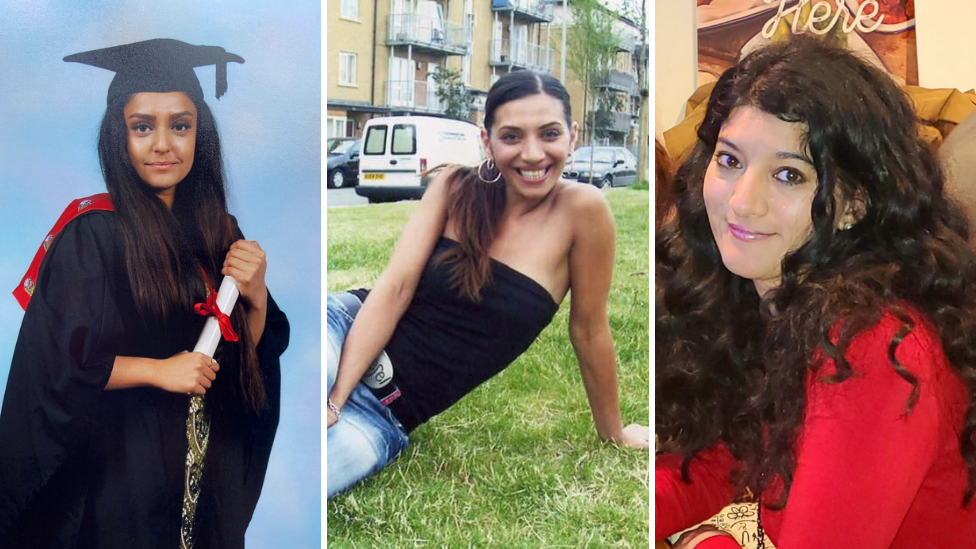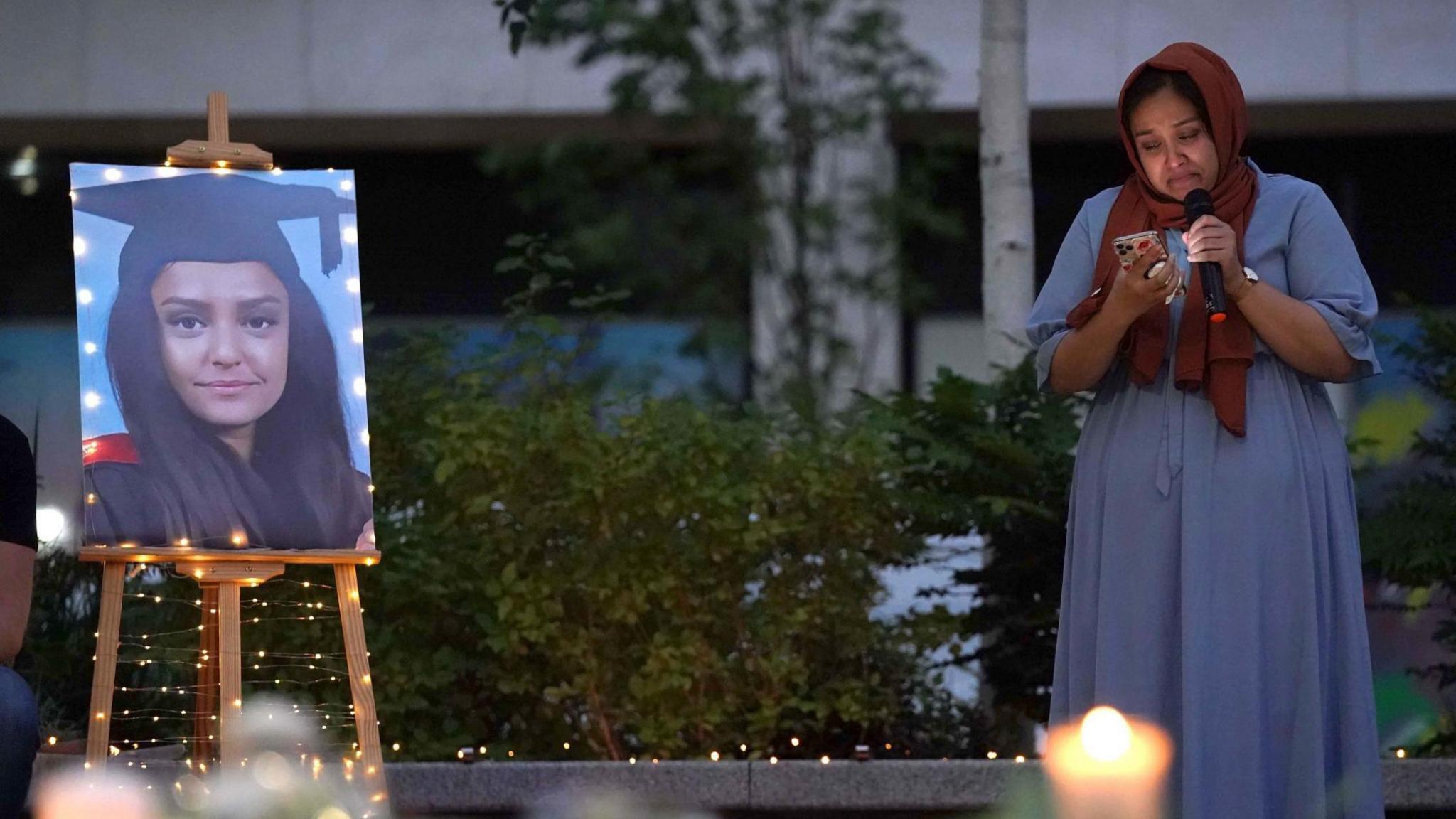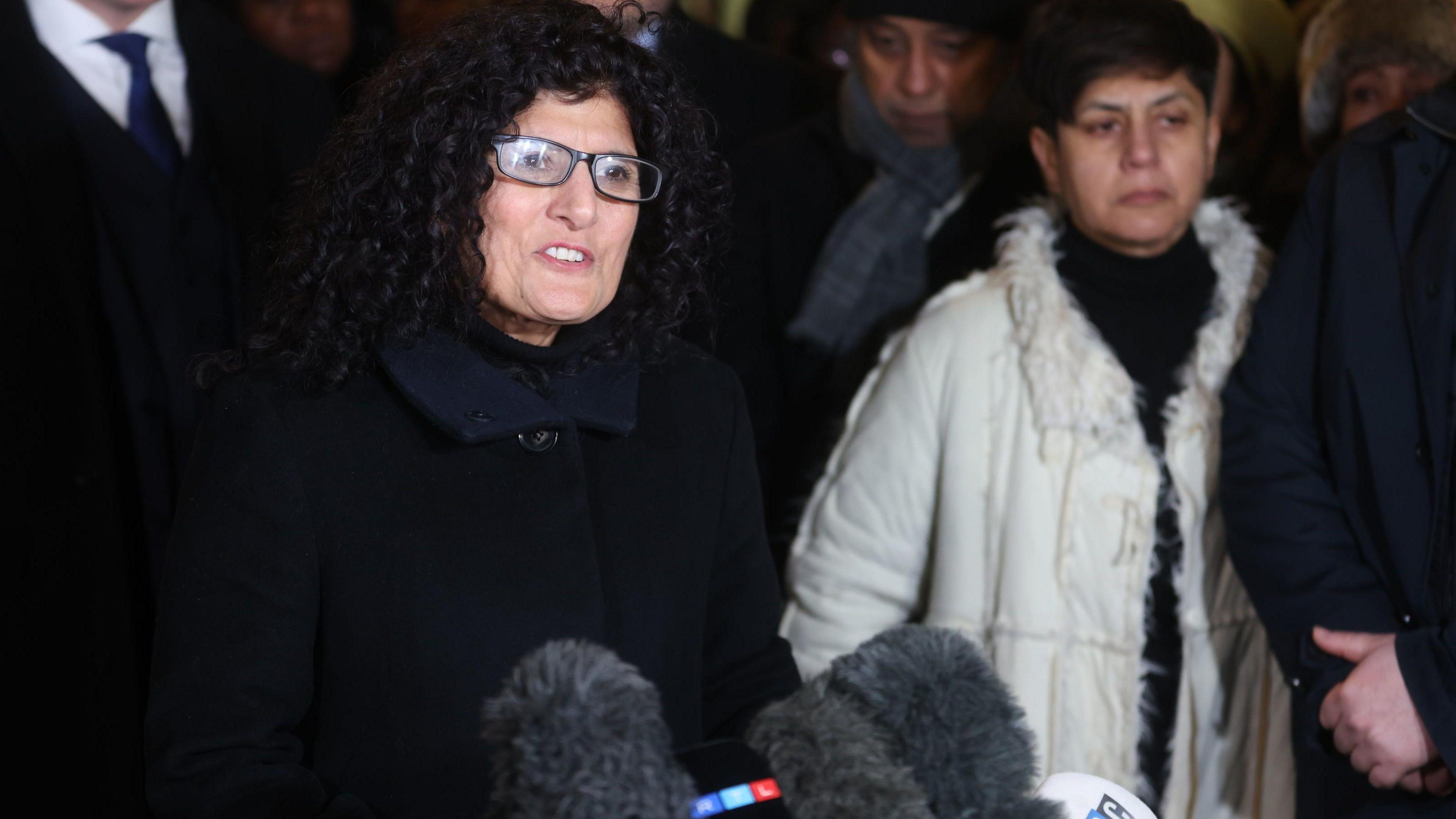Criminals who skip sentencing could face more jail time

The killers of Sabina Nessa, Jan Mustafa and Zara Aleena all refused to attend their sentencing hearings after being convicted of murdering the women
- Published
Criminals who refuse to attend sentencing in England and Wales could face an additional two years in prison, under a new bill introduced in Parliament on Wednesday.
Additional powers for judges to punish offenders absent from sentencing will mean they cannot "opt out" of justice, victims' families have said.
"It is not about punishment through force - but about ensuring that perpetrators cannot remove themselves from the consequences of their actions," said the families of murdered primary school teacher Sabina Nessa, law graduate Zara Aleena and mother-of-three Jan Mustafa.
All of their loved ones' killers did not attend their sentencing hearings, prompting calls to change the law.
New measures under the Victims and Courts Bill could apply to any case in the Crown Court, including those who attend proceedings but are removed from court for disruptive behaviour - like Southport killer Axel Rudakubana.
Offenders already facing whole life orders could be confined to their cells and be stripped of privileges, like extra gym time, under the new bill.
Koci Selamaj is currently serving a life sentence after being convicted of murdering Ms Nessa whom he attacked in September 2021 as she walked through a park in south-east London.
He refused to turn up for his sentencing at the Old Bailey in April 2022 and since then Ms Nessa's sister, Jebina Yasmin Islam, has campaigned for changes to the law.
She believes the bill - which will only become law once it has been approved by MPs and the House of Lords - is a "step in the right direction".
"I just hope it will give some sort of peace and justice to victims' families," she told BBC Breakfast.
"When we went through the process we felt the process was on the defendants side but now I feel the victims are in the forefront."
The updated bill was introduced to Parliament on Wednesday, but still faces a vote in the House of Commons and the House of Lords
The next stage will be the plans facing a second reading in the Commons, which is the first time MPs can debate and vote on the measures reaching the next stage.

Jebina Yasmin Islam (right) has campaigned for changes to the law, after the killer of her sister Sabina Nessa refused to attend sentencing
Ayse Hussein, cousin of Ms Mustafa, said it was "quite insulting" when double killer Zahid Younis refused to hear victim impact statements they had been asked to prepare ahead of his sentencing in 2020.
"To be told he was not attending, we were not aware that was a thing at the time, so it was really shocking for us to be told he was going to be staying in his cell," she told the BBC.
"Why put a family through so much pain at the beginning writing these impact statements to be reading it to an empty dock. It's very painful, it's heartbreaking."
Ms Aleena was murdered in June 2022 as she walked home after having drinks with a friend in Ilford, east London.
Jordan McSweeney, from Dagenham, was captured on CCTV stalking the streets of Ilford approaching women before he pounced on and fatally beat Ms Aleena.
McSweeney refused to attend his sentencing at the Old Bailey when he was jailed for a minimum of 38 years.
In November 2023, three Court of Appeal judges reduced McSweeney's sentence by five years - much to the "extreme disappointment" of Ms Aleena's family.
Reacting to the latest developments, Ms Aleena's aunt Farah Naz said she views the proposed bill as a "symbolic balance of power" both to the victims and to the law.
"The simpler the deterrent, the simpler the measure, the simpler the punishment - like additional time to a sentence - the better and the more likely we are to having these measures being implemented."

Zara Aleena's aunt, Farah Naz, said the family saw McSweeney as 'someone who stamped his pain on to Zara'
Powers already exist to compel people to attend court but National Chair of the Prison Officers Association Mark Fairhurst explained why they are often not used by judges.
He told BBC Breakfast: "To restrain someone to the dock, has its risks.
"If we have cuffed them in the dock and they continue to be disruptive and abusive that could be even more traumatic for the victims and their families."
Mr Fairhurst said an extra two years in prison for someone facing a lengthy jail term "doesn't make any difference" but he said restricting family visits to being behind glass and criminals not being eligible for parole were other options which could be considered.
The Murder of Sabina Nessa
Primary school teacher Sabina Nessa was killed at random by a man with a history of violence.
In January, Prime Minister Sir Keir Starmer promised to follow through on the legislation - initiated by the previous Conservative government - after meeting Cheryl Korbel.
Her daughter, Olivia Pratt-Korbel, was shot dead in her home in August 2022, aged nine. Olivia's killer Thomas Cashman did not attend court as he was jailed for 42 years.
Anneliese Midgley, Ms Korbel's MP, said: "This law is down in no small part to my constituent Cheryl Korbel. I am so proud of her.
"Sentencing is not just a legal formality; it is the culmination of justice. That's why it's so important that justice is not only done, but seen to be done."
Justice Minister Alex Davies-Jones said: "I would like to thank the remarkable families of Olivia Pratt-Korbel, Jan Mustafa, Sabina Nessa and Zara Aleena and countless others who have campaigned tirelessly for offenders to have to face the reality of their crimes by attending their sentencing."
"Justice isn't optional - we'll make sure criminals face their victims," she added.
Related topics
- Published7 May
